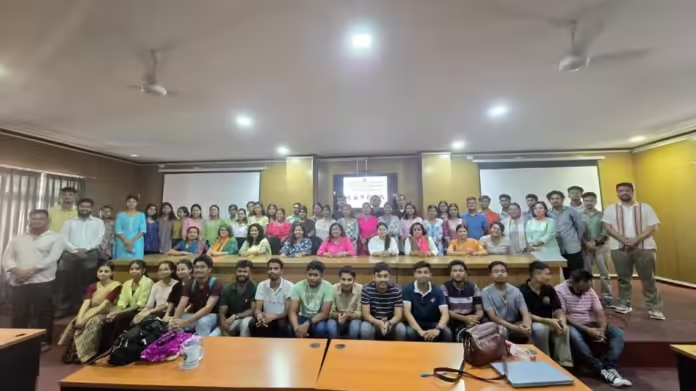In a groundbreaking collaboration, the Assam Women Journalists’ Forum (AWJF) has teamed up with Gauhati University to host an insightful session focusing on climate change and gender issues. This partnership marks a significant step towards addressing the intersection of environmental challenges and gender inequality in Assam. The session aims to educate, engage, and empower participants by highlighting the impact of climate change on women and fostering discussions on effective strategies for advocacy and action.
Objectives of the Session
The session organized by AWJF and Gauhati University seeks to achieve several key objectives:
- Raise Awareness: To increase understanding of how climate change disproportionately affects women, particularly in the context of rural and marginalized communities in Assam.
- Highlight Gender Disparities: To discuss the specific challenges faced by women due to climate-related issues such as extreme weather events, loss of livelihood, and displacement.
- Promote Gender-Responsive Climate Policies: To advocate for the integration of gender perspectives in climate change policies and initiatives, ensuring that women’s voices and needs are addressed.
- Encourage Action: To empower participants with knowledge and tools to take proactive steps in their communities to address climate change and gender inequality.
Key Highlights of the Collaboration
The collaboration between AWJF and Gauhati University brings together media professionals, academics, and activists to tackle the dual challenges of climate change and gender inequality. Here are some key highlights of the session:
- Expert Speakers and Panelists: The session features a diverse lineup of experts, including environmental scientists, gender studies scholars, and experienced journalists. These speakers will provide valuable insights into the intersection of climate change and gender, sharing research findings, case studies, and practical recommendations.
- Interactive Workshops: Attendees will participate in interactive workshops designed to explore the impact of climate change on women’s lives, including discussions on adaptation strategies, policy advocacy, and community engagement.
- Case Studies and Success Stories: The session will showcase case studies and success stories from various regions, demonstrating effective approaches to integrating gender considerations into climate action and policy-making.
- Networking Opportunities: Participants will have the opportunity to network with experts, peers, and activists, fostering connections that can lead to collaborative efforts and further initiatives.
The Importance of Addressing Climate Change and Gender
The focus on climate change and gender is crucial for several reasons:
- Disproportionate Impact on Women: Women, especially in rural and developing areas, often bear the brunt of climate change impacts due to their roles in agriculture, water management, and household responsibilities. Extreme weather events, such as floods and droughts, can exacerbate existing inequalities and lead to increased economic and social vulnerabilities.
- Gender Inequality in Climate Policy: Historically, climate policies and decision-making processes have often overlooked gender perspectives, resulting in inadequate support for women and their specific needs. Addressing this gap is essential for creating more effective and inclusive climate action strategies.
- Empowering Women as Agents of Change: Women play a crucial role in climate adaptation and mitigation efforts. Empowering women through education, resources, and decision-making power can enhance their ability to contribute to sustainable solutions and drive positive change in their communities.
AWJF’s Role and Impact
The Assam Women Journalists’ Forum has been at the forefront of promoting gender equality and social justice through journalism and advocacy. This collaboration with Gauhati University represents a major expansion of AWJF’s efforts to address pressing global issues such as climate change.
By organizing this session, AWJF aims to:
- Leverage Media Influence: Utilize the media’s reach to raise awareness about the intersection of climate change and gender, ensuring that these critical issues receive the attention they deserve.
- Strengthen Advocacy: Equip journalists and activists with the knowledge and tools needed to advocate effectively for gender-responsive climate policies and initiatives.
- Foster Collaboration: Build partnerships between media, academia, and grassroots organizations to create a unified approach to tackling climate change and gender inequality.
Gauhati University, a leading educational institution in Assam, brings academic expertise and research capabilities to the collaboration. The university’s involvement in the session underscores its commitment to addressing global challenges and contributing to the development of sustainable solutions.
Key contributions of Gauhati University include:
- Academic Insights: Providing research-based insights and analysis on the impact of climate change on women, as well as the effectiveness of gender-responsive policies.
- Educational Resources: Offering access to educational resources and tools that can support participants in understanding and addressing the complex interplay between climate change and gender.
- Engagement with Students: Engaging students and faculty in discussions on climate change and gender, fostering a culture of awareness and activism within the academic community.
The partnership between the Assam Women Journalists’ Forum and Gauhati University represents a major effort to address the critical intersection of climate change and gender inequality. By bringing together experts, activists, and academics, the session aims to raise awareness, promote gender-responsive climate policies, and empower individuals to take action.


